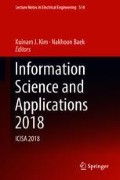Abstract
In a complex Zigbee network for Micro Grid communication, a Zigbee node is affected by other Zigbee nodes and thus must predict their behaviors to communicate without collision. Therefore, this paper discusses the method of the network configuration according to Nash equilibrium for communication in strategic competition adopted by Zigbee network. It intended to show the efficiency increased by application of game theory through the simulation of communication under a competitive situation using OPNET. For the simulation, it configured OPNET for the worst situation of the Zigbee network communication environment, which were the distance between the nodes, the transmit power of node, and the number of nodes to reach avoid. It indicated that all nodes must know the information of when the communication started and ended or avoid the worst or avoid the situation to configure the Nash equilibrium under the strategic competition of Zigbee network.
Access this chapter
Tax calculation will be finalised at checkout
Purchases are for personal use only
References
Kim H-J, Lee SY (2015) A game theoretic decision making on the prices for surplus and deficiency of power generation in the micro grids. Korean Energy Econ Rev 14:1–34 (in Korean)
Saad W, Han Z, Poor HV, Başar T (2012) Game-theoretic methods for the smart grid: an overview of microgrid systems, demand-side management, and smart grid communications. Signal Process Mag 29(5):86–105
Saad W, Han Z, Poor HV (2012) A game theoretic approach for multi-hop power line communications. Game Theory Netw:546–561
Saad W, Han Z, Poor HV (2011) Coalitional game theory for cooperative micro-grid distribution networks. In: IEEE International conference, proceedings of in communications workshops (ICC), 5–9 June, Kyoto, Japan, pp 1–5
Friedman D, Friedman DP, Rust J (1993) The double auction market: institutions, theories, and evidence. Boulder, CO, Westview
Weaver WW, Krein DP (2009) Game-theoretic control of small-scale power systems. IEEE Trans Power Deliv 24(3):1560–1567
Kasbekar GS, Sarkar S (2012) Pricing games among interconnected microgrids. In: Proceedings of power and energy society general meeting, IEEE, 22–26 July, San Diego, USA, pp 1–8
Mohsenian-Rad H, Wong VWS, Jatskevich J, Schober R, Leon-Garcia A (2010) Autonomous demand side management on game-theoretic energy consumption scheduling for the future smart grids. IEEE Trans Smart Grid 1(3):320–331
Vytlingum P, Voice TD, Ramchurn SD, Rofers A, Gennings NR (2010) Agent-based microstorage management for the smart grid. In: Proceedings of international conference on autonomous agents and multiagent systems (AAMAS), Toronto, Canada, pp 39–46
Gamma PHRP, Gouvea MR, Torres GL (2007) Cost allocation by cooperation among distributed generators inside a micro grid using the cooperative game theory. In: Proceedings of 19th international conference on electricity distribution (CIRED’07), Vienna
Huh J-H, Seo K (2015) Hybrid advanced metering infrastructure design for micro grid using the game theory model. Int J Softw Eng Appl SERSC 9(9):257–268
Huh J-H, Je S-M, Seo K (2016) Design and configuration of avoidance technique for worst situation in zigbee communications using OPNET, Information Science and Applications (ICISA 2016). Lecture notes in electrical engineering, vol 376. Springer, Berlin, pp 331–336
Acknowledgements
This work was supported by the National Research Foundation of Korea (NRF) grant funded by the Korea government (MSIT) (No. 2017R1C1B5077157).
Author information
Authors and Affiliations
Corresponding author
Editor information
Editors and Affiliations
Rights and permissions
Copyright information
© 2019 Springer Nature Singapore Pte Ltd.
About this paper
Cite this paper
Je, SM., Huh, JH. (2019). Nash Equilibrium Solution for Communication in Strategic Competition Adopted by Zigbee Network for Micro Grid. In: Kim, K., Baek, N. (eds) Information Science and Applications 2018. ICISA 2018. Lecture Notes in Electrical Engineering, vol 514. Springer, Singapore. https://doi.org/10.1007/978-981-13-1056-0_58
Download citation
DOI: https://doi.org/10.1007/978-981-13-1056-0_58
Published:
Publisher Name: Springer, Singapore
Print ISBN: 978-981-13-1055-3
Online ISBN: 978-981-13-1056-0
eBook Packages: EngineeringEngineering (R0)

